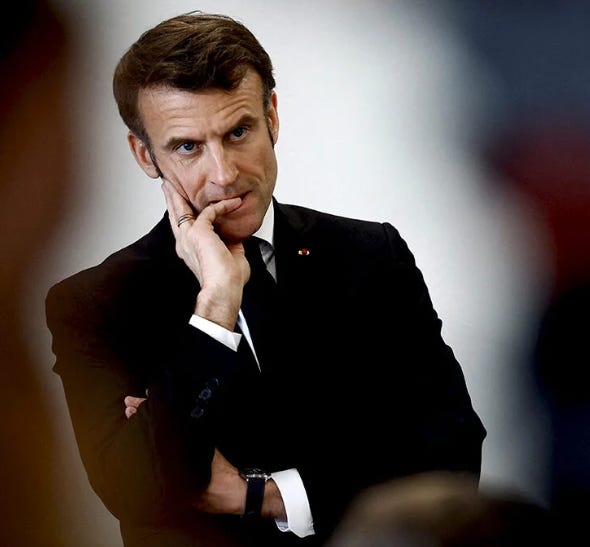Macron while asking for sacrifices from the French people realizes he is wearing a € 80,000 watch and like a magician makes it disappear under the table. Best thing about this amazing Macron-incident-candid-to-replace-his-rolex/omega is that the smoothness of the move suggests the tantalizing possibility that this isn't the first time Macron has discreetly removed a luxury watch after realizing it was inappropriate for the circumstances.
Macron’s first public appearance since forcing an unpopular increase in the retirement age through parliament on 16 March may have been intended to calm a seething nation. But little about his statements will reassure those still livid about the reform and his means of passing it.
Macron gave an interview to French public television at 1pm today (22 March), French time, a time of day that was interpreted as being targeted at the elderly, the president’s core electorate and the most favourable to the retirement reform, according to polls. Working-age people – far more likely to oppose raising the pension age from 62 to 64 – were also the least likely to be watching at lunchtime on a weekday: most were at work.
In the interview, conducted by two journalists in the Élysée Palace, Macron took a combative and unremorseful tone. Asked if he feels he did anything wrong, the president replied that his only regret was that he “failed to convince the people of the necessity of the reform”. He insisted that the reform, which was not subject to a single vote in the National Assembly, was passed via the “parliamentary process”.
During the 35-minute-long interview, Macron’s concessions to his opponents were few. Although he did say that he has a duty to listen to “legitimate anger which is not violence”, his substantive pledges were vague and limited. He suggested working with trade unions to improve conditions for people in “difficult jobs” and career prospects for workers generally.
The president, who several times spoke over Marie-Sophie Lacarrau, one of the France 2 journalists interviewing him, denied that his refusal to submit the pension reform to a vote by parliament meant he is now a lame duck president in his remaining four years in power. Macron added that he retains confidence in Élisabeth Borne, his prime minister, whom he said he had instructed to “broaden” the number of MPs backing him in parliament.
Macron said, however forming a coalition would be “contrary to France’s political culture”. But if he retains merely a plurality of MPs, he is likely to find his agenda increasingly held up by a parliament more willing to stand up to him.
Immediately after the president stopped speaking, politicians and trade unions lined up to respond. Few who were not already supportive of the president had much positive to say, indicating that Macron’s intervention is unlikely to calm tensions, with protests continuing across France and occasionally spilling into violence.
Philippe Martinez, the general secretary of the CGT, one of France’s main unions, offered perhaps the most succinct assessment, saying simply: “This interview is a piss-take.”





